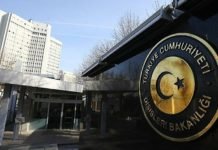A former teacher who was fired from the civil service following a July 15, 2016 coup attempt in Turkey and his family haven’t been allowed to stay in a student dormitory that was allocated to people displaced by deadly earthquakes that struck southern Turkey last month, the Tr724 news website reported on Wednesday.
M.Ç. and his family were living in the southern Turkish province of Kahramanmaraş, which was among the 11 provinces hit hardest by a magnitude-7.8 earthquake in the early morning hours of February 6 and a magnitude-7.5 quake later the same day, that have claimed the lives of more than 50,000 people in Turkey and northern Syria.
Their home collapsed in the earthquakes, and they applied to stay in a student dormitory in the central Turkish province of Niğde, but their application was rejected following a security check by the police.
Indicted by prosecutors for alleged links to the Gülen movement, M.Ç. is currently standing trial.
Turkish President Recep Tayyip Erdoğan has been targeting followers of the Gülen movement, inspired by Turkish Muslim cleric Fethullah Gülen, since the corruption investigations of December 17-25, 2013, which implicated then-prime minister Erdoğan, his family members and his inner circle.
Dismissing the investigations as a Gülenist coup and conspiracy against his government, Erdoğan designated the movement as a terrorist organization and began to target its members. He intensified the crackdown on the movement following an abortive putsch that he accused Gülen of masterminding. Gülen and the movement strongly deny involvement in the coup attempt or any terrorist activity.
The Justice and Development Party (AKP) government declared a state of emergency in the aftermath of a failed coup that remained in effect until July 19, 2018. More than 130,000 public servants, including 4,156 judges and prosecutors, as well as 24,706 members of the armed forces, were summarily removed from their jobs for alleged membership in or relationships with “terrorist organizations” by emergency decree-laws subject to neither judicial nor parliamentary scrutiny.
Post-coup purge victims have been facing discrimination in public services and humanitarian assistance even if they were directly affected by the earthquakes.
Turkey’s former public servants were not only fired from their jobs after the coup attempt; they were also prohibited from working again in the public sector and getting a passport. The government also made it difficult for them to work formally in the private sector. Notes were put on the social security database about dismissed public servants to deter potential employers.
Most recently, the Scientific and Technological Research Council of Turkey (TÜBİTAK) announced a scholarship program for students who were affected by earthquakes, stating that individuals who were dismissed by emergency decrees are not eligible to apply.
















